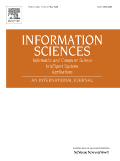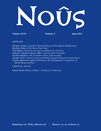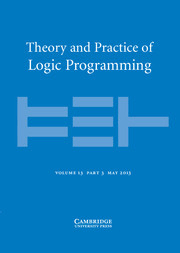
INTERNATIONAL JOURNAL OF APPROXIMATE REASONING
Scope & Guideline
Empowering Academics with Cutting-Edge Knowledge
Introduction
Aims and Scopes
- Approximate Reasoning Techniques:
The journal emphasizes methodologies for reasoning under uncertainty, including fuzzy logic, belief functions, and three-way decision-making frameworks, which are essential for applications in artificial intelligence and decision support systems. - Data Science and Machine Learning Applications:
A significant portion of the journal's content is dedicated to the intersection of approximate reasoning and data science, exploring machine learning techniques, feature selection, and classification methods that incorporate uncertain or imprecise data. - Formal Concept Analysis and Lattices:
There is a strong focus on formal concept analysis, including the development of concept lattices and their applications in knowledge representation, information retrieval, and decision-making processes. - Argumentation Theory and Nonmonotonic Reasoning:
The journal includes research on argumentation frameworks and nonmonotonic reasoning, enhancing the understanding of how arguments can be structured and evaluated in uncertain environments. - Decision Making Under Uncertainty:
Research often addresses decision-making strategies that utilize approximate reasoning models to handle imprecise information, emphasizing three-way decision-making approaches.
Trending and Emerging
- Integration of Machine Learning and Approximate Reasoning:
Research increasingly explores the synergies between machine learning and approximate reasoning, focusing on how these fields can inform and enhance each other, particularly in contexts of uncertainty and imprecision. - Three-Way Decision-Making Frameworks:
There is a growing interest in three-way decision-making frameworks, which offer nuanced approaches to classification and decision support in uncertain environments, highlighting their practical applications in diverse fields. - Robustness and Uncertainty in AI Systems:
Emerging themes focus on the robustness of AI systems under uncertainty, with research addressing the challenges of maintaining reliability and validity in decision-making processes involving imprecise data. - Advanced Argumentation Techniques:
Recent publications increasingly delve into advanced techniques in argumentation theory, particularly in the context of dynamic and uncertain environments, reflecting a deeper exploration of the interplay between reasoning and argumentation. - Causal Reasoning and Probabilistic Models:
Causal reasoning and the development of probabilistic models have gained prominence, with a focus on how these frameworks can be applied to real-world problems, enhancing the understanding of decision-making under uncertainty.
Declining or Waning
- Traditional Statistical Inference Methods:
There is a noticeable decrease in publications focused solely on traditional statistical inference methods, as researchers increasingly favor approaches that integrate approximate reasoning and machine learning techniques. - Basic Fuzzy Set Theory Applications:
Although foundational fuzzy set theory remains relevant, applications that do not extend beyond basic concepts are less frequently addressed, indicating a shift towards more complex and integrated methodologies. - Simple Decision Trees and Rules:
The focus on simplistic decision tree algorithms and rule-based systems has diminished, with a trend towards more sophisticated ensemble methods and hybrid approaches that combine multiple techniques.
Similar Journals

Fuzzy Information and Engineering
Unlocking Potential in Control Systems and Artificial IntelligenceFuzzy Information and Engineering is a prestigious open access journal recognized for its contributions to the interdisciplinary fields of applied mathematics, control systems engineering, artificial intelligence, and information systems, published by TSINGHUA UNIVERSITY PRESS. With an impact factor that reflects its increasing influence, the journal has maintained a strong position in the academic community since its inception in 2011, converging its focus between 2014 and 2024. The journal is indexed in notable databases such as Scopus, demonstrating solid rankings across its categories, including a commendable Q3 classification in applied mathematics and control systems engineering. By fostering innovative research and disseminating key findings, Fuzzy Information and Engineering serves as a vital platform for researchers, professionals, and students alike, promoting advancements in fuzzy systems and their applications within diverse domains. Notably, since transitioning to an open access model in 2015, the journal has enhanced accessibility for a global audience, encouraging collaborative efforts in academia and industry.

INFORMATION SCIENCES
Navigating the Future of Information ScienceINFORMATION SCIENCES, published by Elsevier Science Inc, is a premier peer-reviewed journal that has become instrumental in advancing the field of information science since its inception in 1968. With an impressive array of quartile rankings in 2023, including Q1 in Artificial Intelligence, Computer Science Applications, Control and Systems Engineering, Information Systems and Management, Software, and Theoretical Computer Science, this journal serves as a vital resource for researchers and professionals looking to explore cutting-edge theories and practical applications within these domains. The journal is indexed extensively, with notable Scopus rankings, reflecting its significance and influence in the academic community—ranked 6th in Theoretical Computer Science and 10th in Information Systems and Management, among others. Although it does not currently offer an open-access option, the depth of research published within INFORMATION SCIENCES ensures that it remains a key reference point for advancing academic inquiry and addressing complex challenges in the information landscape.

AUTOMATIC DOCUMENTATION AND MATHEMATICAL LINGUISTICS
Pioneering research at the intersection of linguistics and technology.AUTOMATIC DOCUMENTATION AND MATHEMATICAL LINGUISTICS is a leading journal published by PLEIADES PUBLISHING INC, dedicated to advancing the field of linguistics through the rigorous application of mathematical techniques and automated methodologies. With an ISSN of 0005-1055 and an E-ISSN of 1934-8371, this journal provides a critical platform for researchers and professionals interested in the intersection of language processing and computational analysis. Although it does not currently offer open access options, it remains a pivotal resource within the academic community. Its high scholarly standards and commitment to excellence ensure that published articles contribute meaningfully to the discourse on automatic documentation and mathematical linguistics, making it an essential read for academics, students, and practitioners alike. Explore a wealth of knowledge that reflects contemporary developments and future directions in this vital area of study.

Fuzzy Optimization and Decision Making
Leading the Charge in Fuzzy Optimization ResearchFuzzy Optimization and Decision Making, published by Springer, is a prestigious academic journal that has made significant contributions to the fields of Artificial Intelligence, Logic, and Software. With an impressive impact factor and a consistent ranking in the top Q1 quartile across its categories, this journal stands at the forefront of research dissemination in its domain. Established in 2002 and continuing through 2024, the journal focuses on the theoretical and practical aspects of fuzzy optimization methods and their applications in decision-making scenarios. The journal is highly regarded for its rigorous peer-review process and aims to present innovative research findings that inspire advancements in optimization techniques using fuzzy logic. Aimed at researchers, professionals, and students alike, Fuzzy Optimization and Decision Making serves as an essential resource for those looking to stay at the cutting edge of technology and methodology in mathematics and computer science.

Entropy
Advancing interdisciplinary insights in science and engineering.Entropy is an esteemed open-access journal published by MDPI since 1999, dedicated to the dissemination of research in the fields of Electrical and Electronic Engineering, Information Systems, Mathematical Physics, and Physics and Astronomy. Based in Switzerland, Entropy has garnered significant recognition, achieving a Q2 category ranking across multiple disciplines in 2023, including a commendable 90th percentile rank in Mathematical Physics. The journal not only embodies a commitment to high-quality scholarly content but also serves as a platform for interdisciplinary dialogue among researchers and practitioners. With a robust e-ISSN of 1099-4300, it offers easily accessible publications that encourage collaborations and innovations in tackling complex scientific problems. Researchers, students, and professionals alike will find valuable insights through its curated articles, making Entropy an essential resource for advancing knowledge in its respective fields.

NOUS
Exploring the depths of philosophical inquiry.NOUS is a prestigious academic journal published by WILEY, specializing in the field of Philosophy. Since its inception in 1989, it has maintained a strong reputation within the philosophical community, currently earning a remarkable position in the top quartile (Q1) of its category as of 2023. With an impressive Scopus ranking of #22 out of 806 in the Arts and Humanities – Philosophy category, and achieving a 97th percentile, NOUS serves as a pivotal platform for scholarly discourse, innovative research, and critical thinking. The journal prioritizes high-quality articles that contribute significantly to various philosophical debates, thereby attracting both established and emerging scholars. Although it does not offer an open access option, NOUS is a crucial resource for anyone engaged in serious philosophical inquiry and is dedicated to advancing knowledge and understanding in this rich field.

Information
Empowering innovation in Information Systems.Information is a distinguished open-access journal published by MDPI since 2010, dedicated to advancing the field of Information Systems. With its E-ISSN 2078-2489, the journal serves as a crucial platform for researchers, professionals, and students to disseminate and access innovative research and methodologies in the domain of information science, data management, and technology. Based in Basel, Switzerland, the journal has established a commendable reputation in the academic community, currently holding a Q2 ranking in the prestigious Scopus category of Information Systems, and occupies the 74th percentile among its peers. The breadth of the journal's objectives is to promote and facilitate the open exchange of ideas, research findings, and emerging trends, fostering collaboration and knowledge growth in a rapidly evolving digital landscape. With an unwavering commitment to high-quality scholarship and accessible knowledge, Information plays an essential role in shaping the future of the information sciences.

Intelligenza Artificiale
Driving Excellence in Artificial Intelligence StudiesIntelligenza Artificiale is a prominent academic journal dedicated to advancing the field of artificial intelligence, published by IOS PRESS, a renowned publisher in the scientific community. Based in the Netherlands, this journal's ISSN is 1724-8035 and its E-ISSN is 2211-0097. With a current impact factor that reflects its relevance in the scholarly landscape, it operates in the Q2 quartile of the Artificial Intelligence category as of 2023, which ranks it notably at #200 out of 350 within its field according to Scopus data. The journal provides a valuable platform for researchers, professionals, and students to disseminate and access cutting-edge findings from 2018 to 2024, focusing on the innovative applications and theoretical developments in artificial intelligence. With its commitment to fostering academic dialogue and collaboration, Intelligenza Artificiale is essential for anyone looking to stay at the forefront of AI research and practice.

International Journal of Fuzzy Logic and Intelligent Systems
Leading the Charge in Computational InnovationInternational Journal of Fuzzy Logic and Intelligent Systems, ISSN: 1598-2645, is a prestigious journal published by the Korean Institute of Intelligent Systems, dedicated to advancing the fields of Artificial Intelligence, Computational Theory and Mathematics, Computer Science Applications, Logic, and Signal Processing. Established to foster interdisciplinary research, this journal has quickly established its reputation, reaching a respectable Q3 quartile ranking across multiple categories in 2023. It serves as a vital resource for researchers, professionals, and students, offering insights into cutting-edge methodologies and innovative applications of fuzzy logic and intelligent systems. With a focus on disseminating high-quality research, the journal attracts contributions that drive the evolution of intelligent technologies and their practical implications. Published from South Korea, the journal is positioned to impact the global community, facilitating a deeper understanding of intelligent systems in various domains.

THEORY AND PRACTICE OF LOGIC PROGRAMMING
Exploring Innovations in Computational Theory.THEORY AND PRACTICE OF LOGIC PROGRAMMING, published by Cambridge University Press, is a premier academic journal that delves into the evolving field of logic programming, offering insights and advancements from 2001 to 2024. With an ISSN of 1471-0684 and an E-ISSN of 1475-3081, this journal serves as a vital resource for researchers, professionals, and students interested in areas such as artificial intelligence, computational theory, and software development. In 2023, the journal was recognized for its excellence, achieving Q1 status in Computational Theory and Mathematics and Q2 in several other categories, underscoring its significant impact within the academic community. Despite not being open access, its robust content, curated by esteemed scholars, guarantees high-quality research and innovative methodologies that are crucial for advancing the field. The journal's rigorous peer-review process and its standings in Scopus rankings further emphasize its relevance and authority, making it a quintessential platform for disseminating key findings and fostering scholarly dialogue.